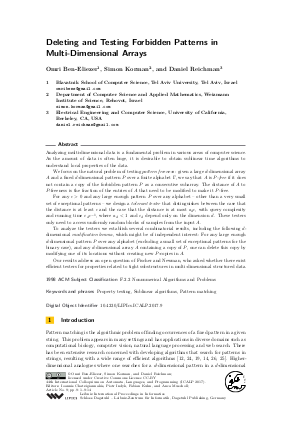Deleting and Testing Forbidden Patterns in Multi-Dimensional Arrays
Authors Omri Ben-Eliezer, Simon Korman, Daniel Reichman
-
Part of:
Volume:
44th International Colloquium on Automata, Languages, and Programming (ICALP 2017)
Part of: Series: Leibniz International Proceedings in Informatics (LIPIcs)
Part of: Conference: International Colloquium on Automata, Languages, and Programming (ICALP) - License:
 Creative Commons Attribution 3.0 Unported license
Creative Commons Attribution 3.0 Unported license
- Publication Date: 2017-07-07
File

PDF
LIPIcs.ICALP.2017.9.pdf
- Filesize: 0.52 MB
- 14 pages
Document Identifiers
Subject Classification
Keywords
- Property testing
- Sublinear algorithms
- Pattern matching
Metrics
- Access Statistics
-
Total Accesses (updated on a weekly basis)
0Document
0Metadata
Abstract
Analyzing multi-dimensional data is a fundamental problem in various areas of computer science. As the amount of data is often huge, it is desirable to obtain sublinear time algorithms to understand local properties of the data.
We focus on the natural problem of testing pattern freeness: given a large d-dimensional array A and a fixed d-dimensional pattern P over a finite alphabet Gamma, we say that A is P-free if it does not contain a copy of the forbidden pattern P as a consecutive subarray. The distance of A to P-freeness is the fraction of the entries of A that need to be modified to make it P-free.
For any epsilon > 0 and any large enough pattern P over any alphabet - other than a very small set of exceptional patterns - we design a tolerant tester that distinguishes between the case that the distance is at least epsilon and the case that the distance is at most a_d epsilon, with query complexity and running time c_d epsilon^{-1}, where a_d < 1 and c_d depend only on the dimension d. These testers only need to access uniformly random blocks of samples from the input A.
To analyze the testers we establish several combinatorial results, including the following d-dimensional modification lemma, which might be of independent interest: For any large enough d-dimensional pattern P over any alphabet (excluding a small set of exceptional patterns for the binary case), and any d-dimensional array A containing a copy of P, one can delete this copy by modifying one of its locations without creating new P-copies in A.
Our results address an open question of Fischer and Newman, who asked whether there exist efficient testers for properties related to tight substructures in multi-dimensional structured data.
Cite As Get BibTex
Omri Ben-Eliezer, Simon Korman, and Daniel Reichman. Deleting and Testing Forbidden Patterns in Multi-Dimensional Arrays. In 44th International Colloquium on Automata, Languages, and Programming (ICALP 2017). Leibniz International Proceedings in Informatics (LIPIcs), Volume 80, pp. 9:1-9:14, Schloss Dagstuhl – Leibniz-Zentrum für Informatik (2017)
https://doi.org/10.4230/LIPIcs.ICALP.2017.9
BibTex
@InProceedings{beneliezer_et_al:LIPIcs.ICALP.2017.9,
author = {Ben-Eliezer, Omri and Korman, Simon and Reichman, Daniel},
title = {{Deleting and Testing Forbidden Patterns in Multi-Dimensional Arrays}},
booktitle = {44th International Colloquium on Automata, Languages, and Programming (ICALP 2017)},
pages = {9:1--9:14},
series = {Leibniz International Proceedings in Informatics (LIPIcs)},
ISBN = {978-3-95977-041-5},
ISSN = {1868-8969},
year = {2017},
volume = {80},
editor = {Chatzigiannakis, Ioannis and Indyk, Piotr and Kuhn, Fabian and Muscholl, Anca},
publisher = {Schloss Dagstuhl -- Leibniz-Zentrum f{\"u}r Informatik},
address = {Dagstuhl, Germany},
URL = {https://drops.dagstuhl.de/entities/document/10.4230/LIPIcs.ICALP.2017.9},
URN = {urn:nbn:de:0030-drops-74427},
doi = {10.4230/LIPIcs.ICALP.2017.9},
annote = {Keywords: Property testing, Sublinear algorithms, Pattern matching}
}
